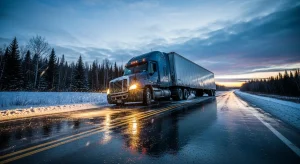While the ATA urges to avoid tariffs on truck imports, some states are seeking the regulation of autonomous trucks and California is losing the clean air battle.
ATA urges avoiding tariffs on the import of medium and heavy trucks
The American Trucking Associations (ATA) and the U.S. Chamber of Commerce have expressed their opposition to a proposed federal investigation under Section 232 of the Trade Expansion Act of 1962. This investigation, announced on April 23, seeks to determine whether the import of medium and heavy trucks and their parts poses a threat to national security. Both organizations argue that no such risk exists and warn that such an investigation could have negative economic consequences.
The ATA argues that imposing new tariffs as a result of this investigation would significantly increase the cost of trucks, directly impacting transportation companies. According to the organization, heavy-duty tractors sold in the U.S. come exclusively from the United States and Mexico—partners in the USMCA agreement—and their production is highly integrated, posing no threat to national security.
Moreover, the ATA stated that trucking companies cannot easily absorb these additional costs or pass them on to their customers. This would lead to a reduction in the purchase of new trucks and an extension of replacement cycles, which in turn would result in a drop in the production of vehicles and parts in both the U.S. and Mexico, affecting the industry and the supply chain as a whole.
Finally, the ATA emphasized that fleet renewal with more modern trucks is not only an economic necessity but also a safety measure. With the current cost of a Class 8 truck hovering around $170,000, a 25% tariff would raise that price to $224,000—a price deemed prohibitive for most companies. For this reason, the association urges the government not to proceed with the investigation or the possible imposition of new tariffs.

States seek to regulate the use of autonomous trucks
In the United States, several states are pushing for legislation to regulate the use of autonomous trucks, given the rapid development of this technology and the lack of updated federal regulations. More than half of the states already have rules in place, but many are considered outdated. Although organizations like OOIDA recognize the potential of autonomous driving, they also warn about the safety risks involved in operating commercial vehicles.
Among these states is Colorado, which could become the first to completely ban the operation of autonomous trucks without a human driver present. Similarly, Delaware and Nevada are moving toward restricting autonomous trucks from operating without human oversight. In Delaware, bill SB46 bans the use of autonomous trucks weighing over 26,000 pounds without a driver and mandates a technology review before 2030. In Nevada, SB395 would prevent the testing and operation of autonomous trucks and buses without a CDL-licensed operator present, citing the lack of federal action and the need to protect the public.
Other states like New York are also looking to introduce similar requirements. Senator Harckham proposed a bill that would require an operator on board for autonomous trucks weighing over 10,000 pounds. In contrast, a similar initiative in Texas (HB4402) failed to advance before the legislative deadline. Meanwhile, companies like Aurora Innovation have already begun deploying autonomous trucks in the state, reflecting the growing debate between technological innovation and public safety.

Senate blocks California clean air regulations
On May 22, the U.S. Senate voted to block California’s rule banning the sale of new gasoline-powered cars starting in 2035, dealing a major blow to the state’s efforts to lead the transition to electric vehicles. The resolution, along with two other measures blocking California environmental regulations, had previously passed the House of Representatives and now heads to the White House for Trump’s signature.
California, which represents 11% of the U.S. auto market, has significant influence over industry trends and has historically received exemptions from the Environmental Protection Agency (EPA) to set its own standards. Governor Gavin Newsom and the state’s environmental authorities have called the congressional action illegal and plan to file a lawsuit to defend their regulations.
The other two resolutions voted to block rules that reduce emissions from medium and heavy-duty vehicles and limit nitrogen oxide pollution from trucks. Democrats criticized Republicans for siding with the oil and gas industry and argued that California should retain its authority to set stricter emissions standards.
In an unprecedented legislative move, Republicans established a new exception to the filibuster that allowed these measures to pass with a simple majority, breaking from the traditional 60-vote threshold. Although they claimed they would not repeat this strategy, Democrats warned that this marks a “point of no return” in Senate norms and accused Republicans of weakening democratic institutions for political convenience.


Frozen Roads After Bomb Cyclone: Black Ice, Record Snow and High Risk for Trucks
Frozen roads continue to disrupt freight transportation following the impact of a powerful bomb cyclone, leaving behind black ice, highway shutdowns, power outages, and dangerous winter driving conditions stretching from the Gulf Coast to New England.

Lunar New Year 2026: Ancient Traditions, Renewed Energy, and Massive Celebrations
Lunar New Year 2026 begins on February 17 under the sign of the Fire Horse and is marked by spiritual rituals, family reunions, and large-scale celebrations in both China and the United States, especially in California.

Freedom 250 Grand Prix: How Logistics and Transportation Will Power the Race in Washington
The first-ever IndyCar street race in Washington, D.C., scheduled for August 21–23, will headline the United States’ 250th anniversary celebrations — and it will trigger a massive transportation, freight, and urban logistics operation behind the scenes.

Groundhog Day: What It Means for Trucking When “Phil Sees His Shadow”
The forecast from America’s most famous groundhog is calling for more winter — and that’s an important signal for the trucking industry and cold-season route planning

Love on the open road: the best dating apps for truckers
If you’re looking for someone to go the long haul with, here are the best dating apps for truck drivers. They say love is everywhere…

The most congested cities in the U.S. and the world in 2025
The annual TomTom Traffic Index produces a ranking of the most congested cities in the world. The annual TomTom Traffic Index presents an analysis of
